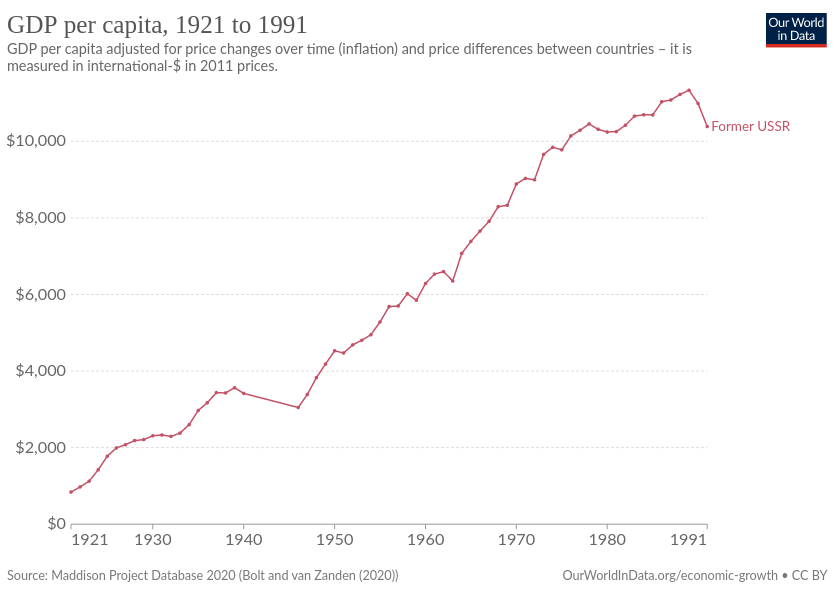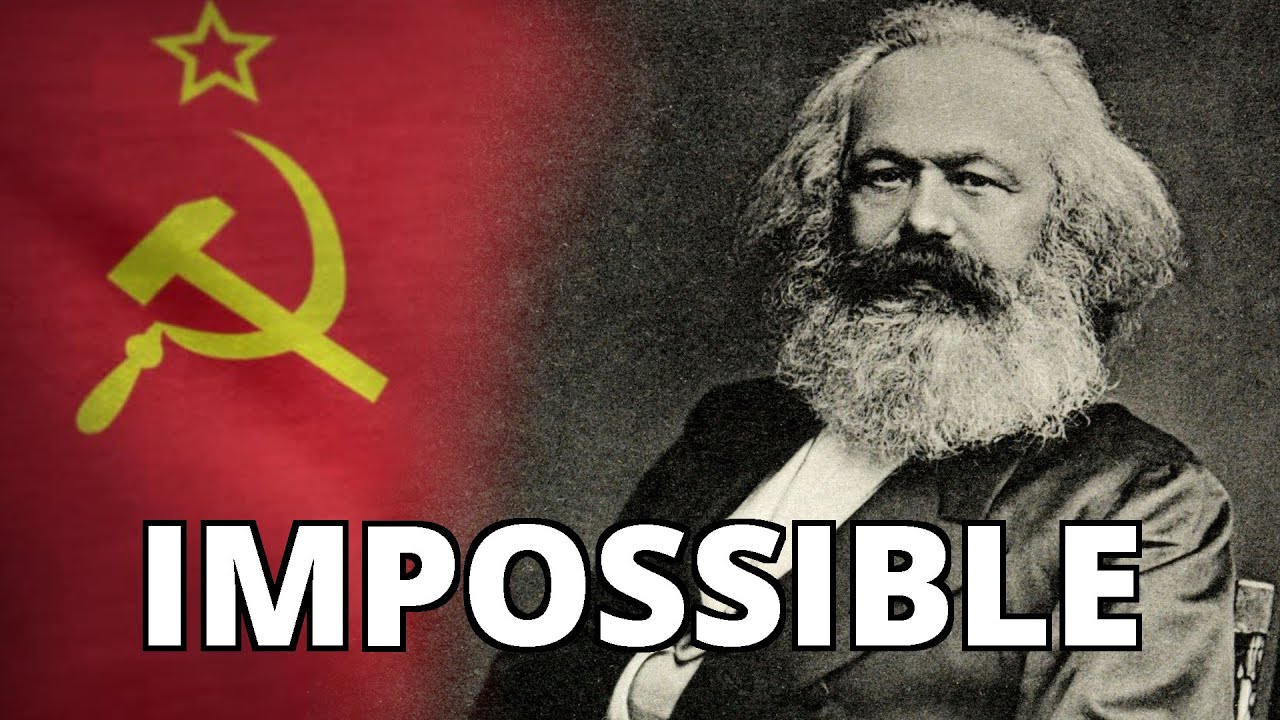The very notion that antisocialist intellectuals can present unsolvable problems to the lower classes is ridiculous. The tide of history isn’t going to grind to a halt and millions of workers aren’t going to suddenly make peace with their bosses or return to capitalism because an antisocialist supposedly discovered a ‘loophole’ in the concept of planned economics.
‘Oh my G‐d! I can’t figure out how much this product should cost! Oh no, what do we do, what do we do‽’
Like all brilliant capitalist economists, much of his theory is based on begging the question, like assuming that only one socialist can or will decide how to distribute resources, and that capitalists assign product prices ‘based on how much people will pay for them’. (Heh.) And notice how heavily he relies on hypotheticals (barring a clip of another antisocialist discussing planning in the Soviet Union). While technically overuse of hypotheticals does not invalidate an argument, it is far less impressive than reliance on real examples.
The most uncomfortable moments for me were when he agreed with the classic oversimplification of democracy as ‘mob rule’ and when he attacked the idea of minimum wages, but neither of those is surprising coming from somebody who admires Vaterländische member № 282632 so much. Anyway, I know that this is a woefully inadequate response, but to be honest I would rather be doing something else. Maybe @aspensmonster@lemmygrad.ml can try—if our comrade is feeling algophilic enough.
I think that what truly invalidates anti-socialists is that they project their utopianism because they have not read a single line of Marx or anyone for the matter and simply don’t know that modern socialism is anti-utopian and therefore argue for long terme transition rather than making up a bunch of cool laws and see them clash with reality.
They’re always asking people of their time if Le Socialism has figured out this specific edge case and the best response is simply “no one can know that. After the revolution, this will be managed just like before, until people figure out how to run it differently. The revolution means that the proletariat gains political power, not that the bourgeoisie will suddenly be buried with all their knowledge of the supply chain”
Oh boy. The Big Bad ECP (Economic Calculation Problem). As @AnarchoBolshevik@lemmygrad.ml implies, you need a certain tolerance for pain to dig into this one (and really anything put out by the Austrian school). I guess I’ll first take a look at the video’s description, since it does have a few paragraphs on the matter.
In this video, I discuss the Economic Calculation Problem (ECP), a problem in economics that shows why socialism is impossible. The ECP was first proposed by Ludwig von Mises, a leading Austrian economist, and it shows that a socialist economy cannot function because it lacks the market prices and information needed for economic calculation and planning. We explore this problem using the example of the Soviet Union, which was a socialist economy that ultimately failed because of its inability to solve the ECP. This video is a must-watch for anyone interested in economics, libertarianism, socialism, and the history of economics.
We’ll start with Wikipedia then, because the ECP does not show “why socialism is impossible.” (Also, stating that the USSR failed “because of its inability to solve the ECP” is particularly reductive and wrong, but not the main topic of discussion here).
In his first article, Mises described the nature of the price system under capitalism and described how individual subjective values (while criticizing other theories of value) are translated into the objective information necessary for rational allocation of resources in society.[1] He argued that economy planning necessarily leads to an irrational and inefficient allocation of resources.
…
Mises and Hayek argued that economic calculation is only possible by information provided through market prices and that bureaucratic or technocratic methods of allocation lack methods to rationally allocate resources. Mises’s analysis centered on price theory while Hayek went with a more feathered analysis of information and entrepreneurship.
…
In the 1920 paper, Mises argued that the pricing systems in socialist economies were necessarily deficient because if a public entity owned all the means of production, no rational prices could be obtained for capital goods as they were merely internal transfers of goods and not “objects of exchange”, unlike final goods. Therefore, they were unpriced and hence the system would be necessarily irrational as the central planners would not know how to allocate the available resources efficiently.[1]
In short, the ECP’s claims are that
- Individual subjective values are translated into the objective information necessary for rational and efficient allocation of resources in society (and that only subjective values can be translated into said “objective” information).
- Such translation of subjective values into objective information can only occur via market prices.
- Said markets must be free of public ownership and must consist of decentralized actors working with objects of exchange.
At best, these claims can be construed to say that socialist economies – well, fully planned socialist economies – are necessarily irrational and inefficient (of course according to bourgeois definitions of rationality and efficiency, but that’s beside the point), not that they fail at a fundamental level. More to the point, these are all very broad and strong claims about a number of facets of economics (that all, incidentally, coincide with laissez-faire, free-market capitalism; not surprising given that the ECP is a product of the Austrian school).
The evidence for each of these claims falls short without even needing to dip into socialist economic theory; the existing history of capitalist economies is more than sufficient to undermine each claim. Chiefly, the capitalist United States during World War II engaged in substantial economic planning, devoting tens of thousands of people to the task of coordinating US civilian and military industry towards the goal of defeating the Axis powers via the War Production Board and Office of War Mobilization (and other organizations as well). Incidentally, this period saw rapid growth of the economy. This single example handily undercuts each of the ECP’s claims.
I explain how the ECP shows that a socialist economy cannot function because it lacks the market prices and information needed for economic calculation and planning. I also discuss the socialist calculation debate, which was a debate among economists about whether a socialist economy could overcome the ECP and achieve economic efficiency.
Again, “cannot function” is overreaching here. The claim ought to be that socialist economy is irrational and inefficient, not that it “cannot function” at all.
One of the key arguments made by proponents of the ECP is that a market economy is necessary for economic calculation and planning. In a market economy, prices are determined by the interaction of supply and demand, and this information is used by producers and consumers to make economic decisions. In contrast, a socialist economy lacks market prices, and this makes it impossible to calculate the costs and benefits of different economic choices.
A restatement of claims (1) and (2). Ok.
Another key argument made by supporters of the ECP is that a socialist economy is inherently inefficient. In a market economy, competition drives producers to constantly improve the quality and price of their goods and services. In a socialist economy, there is no competition, and this means that there is no incentive for producers to innovate and improve. As a result, a socialist economy is likely to be less efficient than a market economy.
A restatement of claims (2) and (3). Ok.
In the Soviet Union, the failure of socialism was particularly evident. The Soviet Union was a socialist economy that was plagued by inefficiency and shortages. Despite the government’s efforts to implement economic planning, the Soviet economy was unable to overcome the ECP and achieve economic growth. Ultimately, the Soviet Union collapsed and transitioned to a market economy.
To say that the USSR was “unable to … achieve economic growth” is flatly wrong. It achieved growth throughout nearly the entirety of its existence:

This growth occurred during the period of Lenin’s NEP, on through Stalin’s strong central planning, on through Khrushchev’s de-Stalinization, all the way through Brezhnev and up to Gorbachev, who, ironically, with his perestroika policies that meant to liberalize the economy, ultimately gave way to the total collapse of the union. Yeltsin’s continued “shock therapy” after the collapse further strained the then-capitalist country’s economy, resulting in an economic contraction that took a decade for the Russian Federation to climb out of and saw a massive decline in standard of living for the working class. (For a detailed analysis, Michael Parenti’s Blackshirts and Reds is a good start.)
The typical line given by liberals is not that the USSR did not grow, but that “it could have grown faster if it was capitalist.”
The ECP shows that socialism is impossible because it lacks the market prices and information needed for economic calculation and planning. The socialist calculation debate and the example of the Soviet Union demonstrate the practical implications of this theory, and support the idea that a market economy is necessary for economic efficiency and growth.
A restatement of the false claim from the prior paragraph.
At this point, we mostly have claims, with little evidence given beyond “but the USSR.” And what little has been said about the USSR so far is plainly wrong. However, I still have yet to watch the video. I will do so and see if it attempts to account for the United State’s economic planning during World War 2.
‘Socialism is impossible because an entrepreneur wouldn’t be able to exploit people and how could you possibly determine value without money?’
I found a YouTube link in your post. Here are links to the same video on alternative frontends that protect your privacy:







